ETH News
All stories that have been tagged with Geoinformation
Maps as instruments of power
- News
- Zukunftsblog

Lorenz Hurni considers what constitutes maps and why they are also instruments of power – and reveals how the Swiss World Atlas deals with disputed names and unilateral name changes.
What location data reveals about you
- News
- Zukunftsblog
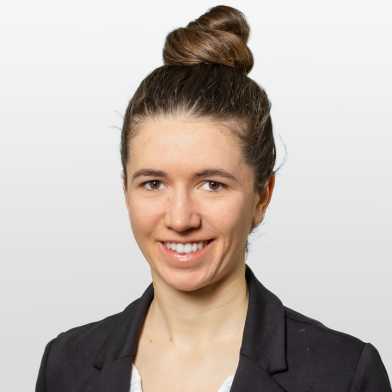
Location data allows rich insights into private details about our lives: where we live and work, how we spend our free time and what is important to us, says Nina Wiedemann. This poses a considerable security risk – even if we have nothing to hide.
“We needed to know how far and how fast the event could travel”
News
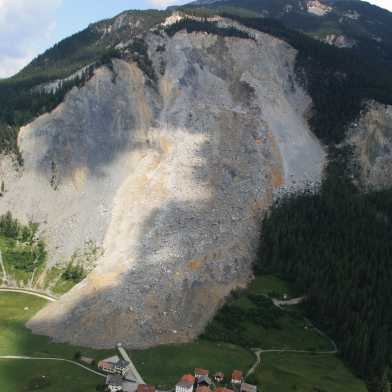
Brienz has just been evacuated for the second time. The decision is based, among other things, on thousands of simulations that ETH professor Jordan Aaron has produced using a computer model he developed. In an interview with ETH News, he explains why this model was used.
“Discipline is an important factor”
News
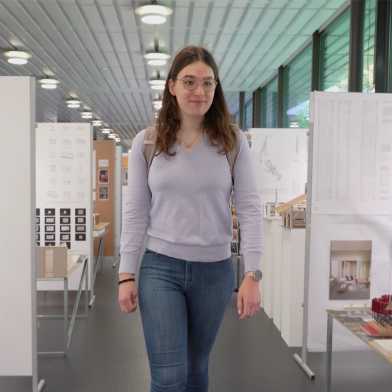
Michelle Halbheer started her studies at ETH feeling uncertain. In a video from the "Student Stories" series, she shares how she overcame her initial doubts and reflects on what she would change if she could start over.
How climate change is altering the Earth’s rotation
News
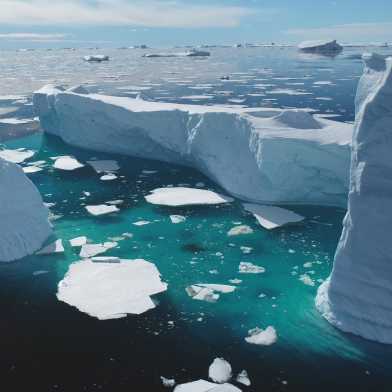
When the Earth’s ice masses melt, the way the planet rotates also changes. Researchers at ETH Zurich have now been able to show how climate change is altering the Earth’s axis of rotation and the length of the day. The speed of rotation, which was hitherto mainly influenced by the moon, will now also depend much more on the climate.
Detecting storms thanks to GPS
News
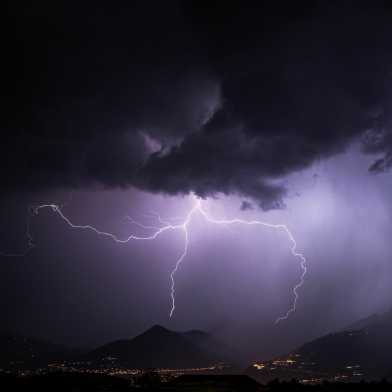
Researchers at ETH Zurich have succeeded in detecting heavy precipitation events directly with GPS data. The results of their study could significantly improve meteorological monitoring and forecasting.
Brumadinho dam collapse: The danger emerged after the decommissioning
News
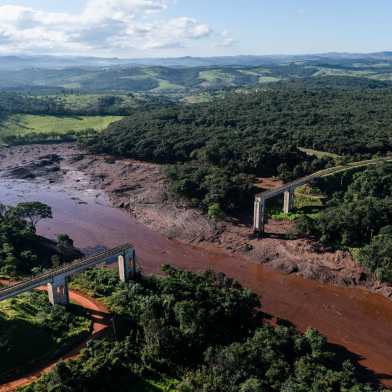
In 2019, the tailings dam at a Brazilian iron ore mine failed. The mudslide caused a catastrophe for people and the environment. A team of researchers at ETH Zurich has now uncovered the physical mechanism that may have triggered the accident.
Accurate snow measurement thanks to AI and satellites
News
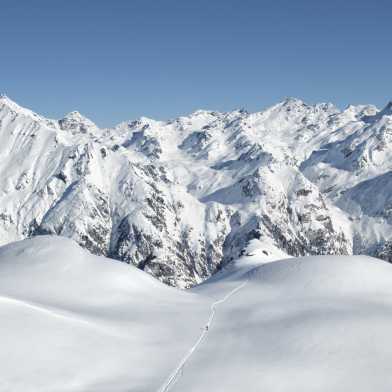
Snow measurement has never been so fast and accurate: ETH Zurich researchers have developed an artificial intelligence capable of determining snow depth across Switzerland using satellite images.
The strength of nature's weakest force
- Globe magazine
- Homehero

Gravity keeps our feet firmly on the ground and Earth in its orbit around the Sun. Meanwhile, satellites in space measure the acceleration caused by the Earth’s gravitational pull.
Neural network can read tree heights from satellite images
News
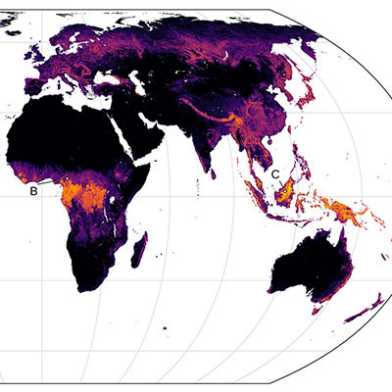
Using an artificial neural network, researchers at ETH Zurich have created the first high-resolution global vegetation height map for 2020 from satellite images. This map could provide key information for fighting climate change and species extinction, as well as for sustainable regional development planning.
The Dyatlov Pass mystery and what a research article can trigger
News
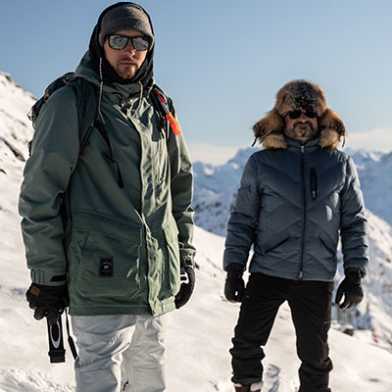
The slab avalanche modelling that Alexander Puzrin and Johan Gaume, two researchers from ETH and EPFL, used to explain the so-called Dyatlov Pass mystery has triggered a variety of responses around the world. In a follow-up article, the two researchers reflect on the impact of their research findings in science and the media and describe the follow up expeditions to the Dyatlov Pass that supported the slab avalanche theory.
Charging electric vehicles with photovoltaics at home
News

An electric car that runs on PV power sounds appealing. But is it really possible to enjoy flexibility with a vehicle charged through a home photovoltaic system? An ETH research team has reached some surprising conclusions.
The Dyatlov pass mystery
News

Two scientists in Switzerland solved the mysterious incident. They tell us in the ETH podcast why they got interested in the incident and what happened after they published their findings.
Global glacier retreat has accelerated
Press release
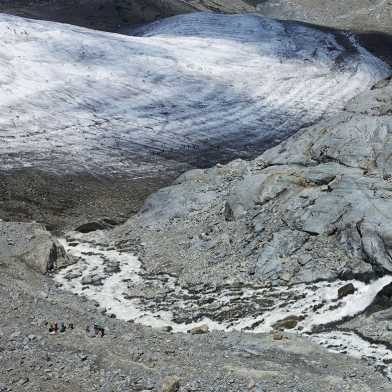
An international research team including scientists from ETH Zurich has shown that almost all the world’s glaciers are becoming thinner and losing mass’ and that these changes are picking up pace. The team’s analysis is the most comprehensive and accurate of its kind to date.
A new take on an old mystery
Press release
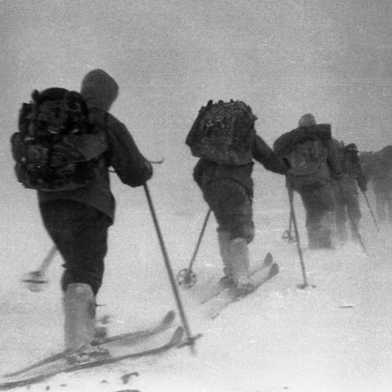
Researchers from EPFL and ETH Zürich have conducted an original scientific study that puts forth a plausible explanation for the mysterious 1959 death of nine hikers in the Ural Mountains in the former Soviet Union.
Robots that cut, bees that bite
News
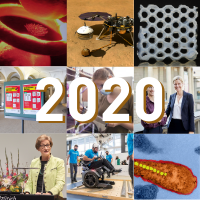
An extraordinary year is drawing to a close. ETH News takes a look back at the highlights that emerged amidst difficult and unsettling times, at ingenious ideas, fascinating science and solidarity in action during – and despite – the coronavirus pandemic.
Earlier than expected
News
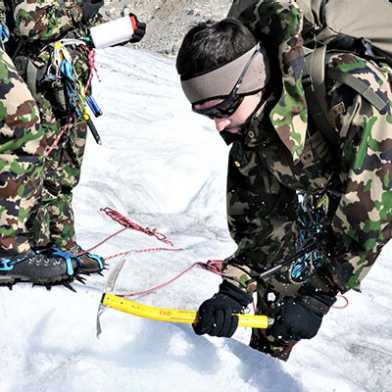
Precisely when will the long-lost US aircraft “Dakota” re-emerge from the Gauli Glacier? Radioactive traces from the Cold War now indicate that this will happen soon.
Foundations for trustworthy artificial intelligence
News

Leading AI researchers from 30 top institutions across Europe are joining forces to form the European AI network ELLIS. Today, it celebrates its launch, with ETH Zurich as a founding member. The ETH Zurich ELLIS Unit is set on establishing the foundations for reliable and trustworthy artificial intelligence.
Mountain vegetation dries out Alpine water fluxes
News
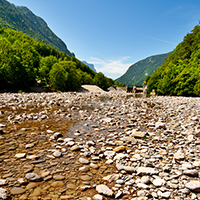
ETH researchers confirm the paradox: rather than withering during droughts, plants at higher elevations absolutely thrive, as a study just published in the journal Nature Climate Change shows.
Gloomy forecast for the Aletsch Glacier
News
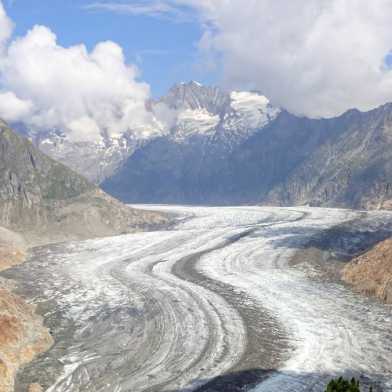
The largest glacier in the Alps is visibly suffering the effects of global warming. ETH researchers have now calculated how much of the Aletsch Glacier will still be visible by the end of the century. In the worst-case scenario, a couple patches of ice will be all that’s left.
Monitoring the Matterhorn with millions of data points
News
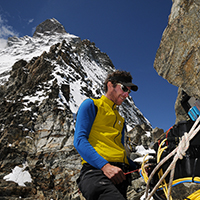
A unique project is linking in-situ measurements with natural hazards research. For the past ten years, a network of wireless sensors on the Matterhorn’s Hörnli ridge has been constantly streaming measurement data on the condition of steep rock faces, permafrost and prevailing climate. The project leader, Jan Beutel, reviews progress to date.
Patience is a virtue
News
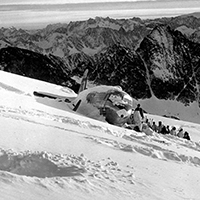
During the last few years, some of the wreckage of a US Air Force plane that crashed on the Gauli Glacier in 1946 has been salvaged. Model calculations carried out by ETH researchers have now shown that it will probably take another 8 to 16 years for the aircraft’s fuselage to resurface from the ice.
Fibre optics as an earthquake sensor
News
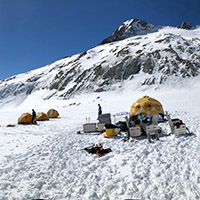
ETH experts in earth sciences and engineering geology have tested out a new method on the Rhone glacier that will allow detailed examination of the interior of the glacier and its movement. The effectiveness of this new technique was better than expected.
Ice volume calculated anew
News
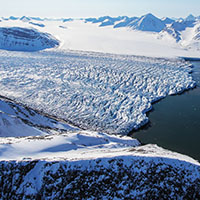
Researchers have provided a new estimate for the glacier ice volume all around the world, excluding the Greenland and Antarctic ice sheets. Their conclusion: previous calculations overestimated the volume of the glaciers in High Mountain Asia.
High-precision navigation for driverless cars
News
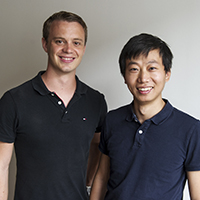
Fixposition is an ETH spin-off specialising in real-time navigation systems for use in self-driving vehicles, robots or industrial drones. Using a combination of satellite-based positioning systems such as GPS with computer vision technologies, the young entrepreneurs have managed to achieve an unparalleled degree of precision.
An ice age lasting 115,000 years in two minutes
News
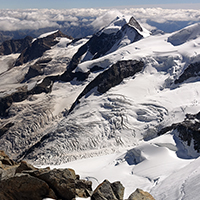
An international research team used a computer model to reconstruct the history of glaciation in the Alps, visualising it in a two-minute computer animation. The simulation aims to enable a better understanding of the mechanisms of glaciation.
Observing glaciers in “real time”
News
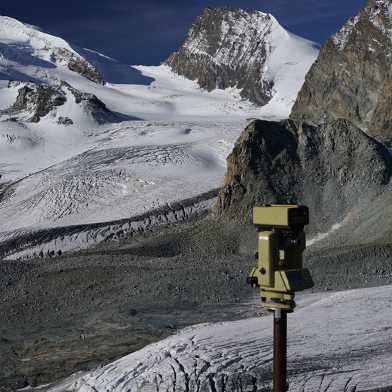
Hot summers cause glaciers to melt. That not only changes the makeup of the landscape and hence the maps of Switzerland, it also affects every area of society. A new, dynamic glacier inventory makes the impact of climate change and the changing landscape visible.
North-exposed ice cliffs accelerate glacier melt
News
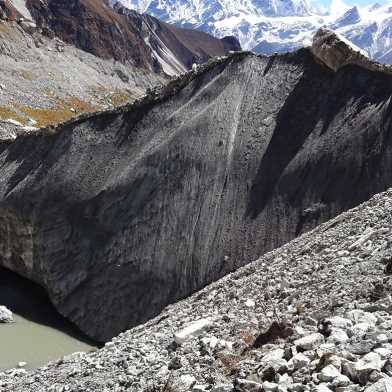
ETH researchers have confirmed the suspicion that north-facing ice cliffs on debris-covered glaciers in the Himalayas accelerate ice melt.
Permafrost in continuous motion
News
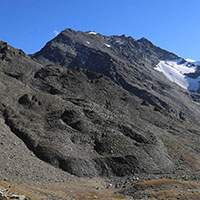
ETH researchers have identified a rock glacier in canton Valais that is degrading and moving very quickly. Fortunately, it does not present an immediate threat to people and infrastructure.
Breathtaking roofs and new students
News
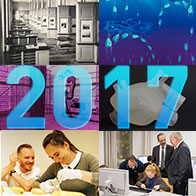
Digital fabrication techniques for buildings and breathtaking concrete roofs, a heart made of silicone, and a new degree programme in medicine; in 2017, teaching and research at ETH Zurich were characterised by new ventures and a pioneering spirit.
A source of inspiration
News

A bed in which you don’t snore and 20 other ETH Zurich research projects with a practical application – Industry Day 2017 offered these inside views. About 600 people from the business community used the platform to engage in an exchange.
City model created from images alone
News
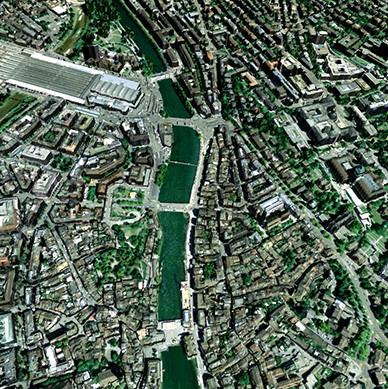
ETH scientists have combined millions of images and videos into a three-dimensional, living model of the city of Zurich. The new technology has many possible applications – for example, it can analyse where and when pedestrians are on the move and parking spaces become free.
Pure genius
News
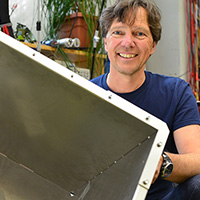
Cornelius Senn, a measurement engineer in the Department of Civil, Environmental and Geomatic Engineering (D-BAUG), and his post-doctoral colleague Silvan Leinss have developed a new reflector for radar measurements. The underlying mechanism, however, has many possible applications and could revolutionise furniture construction, for example.
Chronicle of a catastrophic landslide
News
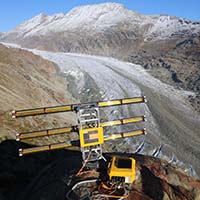
Dramatic developments have been documented at the Aletsch glacier, where the ice has retreated at such a pace that an adjoining slope has also started to move rapidly. With the help of a unique dataset, researchers are able to demonstrate a direct connection between the ice loss of the Aletsch glacier and the slippage of the Moosfluh slope.
Twin glacier collapse in Tibet
Zukunftsblog
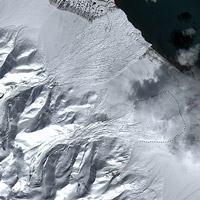
Giant ice avalanches caused by catastrophic glacier failures are rare events. The collapse of two neighbouring glaciers within two months – as just witnessed in Tibet – was never seen before. The timely analysis of satellite images enabled scientists to issue a warning prior to the second collapse.
A leader with good instincts
News
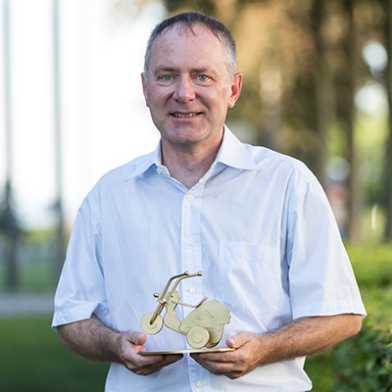
ETH’s sixth annual togETHer staff party was held on Friday, 26th August. It was also a very special occasion for Lorenz Hurni, Professor of Cartography, who was presented with the Golden Tricycle award in recognition of his skill in fostering an optimum balance between work and family life. Arik Jung, President of the Academic Association of Scientific Staff at the ETH Zurich (AVETH), presented him with the award.
Eight professors appointed at ETH Zurich
News
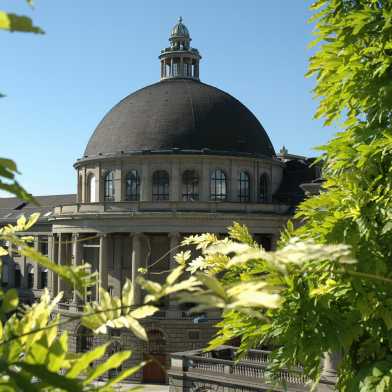
Upon application of ETH President Lino Guzzella the ETH Board appointed a total of eight professors and awarded the title of professor to one individual.
New 3D atlas for map lovers
News
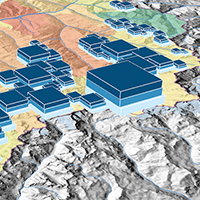
As of 20 June, users can access the Atlas of Switzerland online and free of charge. For the multi-award-winning map series, this marks the end of the era of offline media.
The role of ETH in the Gotthard Base Tunnel
News
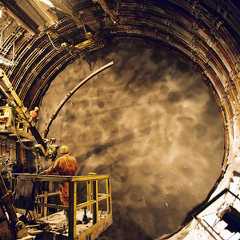
No tunnel without science: the Gotthard Base Tunnel will be opened officially this weekend. The world’s longest railway tunnel relied on the expertise of dozens of ETH alumni and numerous ETH researchers.
«GoEco!» fördert nachhaltige Mobilität
Zukunftsblog

In der Schweiz fällt rund ein Drittel des Energieverbrauchs auf den Verkehr. Unsere Mobilität kostet nicht nur viel, sondern belastet auch Umwelt und Klima. Wärst auch du gern nachhaltiger unterwegs, weisst aber nicht genau wie? Mit der App GoEco! kannst du das eigene Mobilitätsverhalten bewusster planen und optimieren.
Measuring forests with radar
Globe magazine

To find out more about the Earth’s biomass, Irena Hajnsek is collecting data from the air.